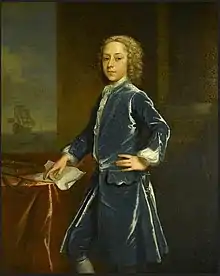Sir Thomas Frankland, 5th Baronet
Admiral Sir Thomas Frankland, 5th Baronet (26 June 1718 – 21 November 1784) was a British naval officer, MP and slave trader.[1] He was the second son of Henry Frankland and Mary Cross. Frankland was born in the East Indies (probably India), his father being a member of the East India Company and briefly Governor of Bengal.
Sir Thomas Frankland, 5th Baronet | |
|---|---|
 Sir Thomas Frankland | |
| Born | 26 June 1718 |
| Died | 21 November 1784 (aged 66) Bath |
| Allegiance | |
| Service/ | |
| Years of service | 1731–1757 |
| Rank | Admiral |
| Commands held | HMS Rose HMS Dragon Leeward Islands Station |
| Battles/wars | War of the Austrian Succession Seven Years' War |
Naval career

He entered the navy in 1731, serving in HMS York under Capt. Philip Vanbrugh, HMS Scarborough, and HMS Oxford before becoming a lieutenant in 1737. On 23 February 1738, he was sent to HMS Chatham, again under Capt. Vanbrugh, where he served for two years. He was briefly transferred to HMS Cumberland in March 1740 before promotion to captain on 15 July 1740 aboard HMS Rose.
He was promptly assigned to carry the newly appointed Governor of the Bahamas, John Tinker, to the islands, and remained in the Bahamas until 1746, fighting Spanish privateers and taking a number of prizes. He then returned home and was given command of HMS Dragon and sent to the West Indies. On 31 July 1755, he was given command of the Leeward Islands Station[2] as a commodore, arriving aboard HMS Winchester in October. Able but stubborn and of a difficult temper, he was involved in quarrels with his predecessor, Thomas Pye, and the local authorities in Antigua. He was promoted rear admiral while there, but refusing to accede to the Admiralty’s wish to control some of the patronage at his disposal (declaring in a letter to the secretary “I have friends of my own to provide for”) fell into immediate disfavour with his superiors. On 5 May 1757, he was replaced by Commodore John Moore, and returned to England in October, never to return to active duty. His promotions, however, continued in the usual manner as he gained seniority, culminating in the rank of Admiral of the White. During his stay in the West Indies he profiteered actively from slave trade.[1]
He had entered Parliament for the family's borough of Thirsk in 1747, and held the seat until 1780, when he sought the governorship of Greenwich Hospital. Unsuccessful, he returned as member for Thirsk in April 1784, but died in November of that year. He had inherited the baronetcy from his older brother in 1768.
The Frankland Islands off Queensland were named after him.
Family
He married Sarah Rhett (of South Carolina, d. 1808) in May 1743 and had a large number of children, of whom nine survived him:
- Sir Thomas Frankland, 6th Baronet (1750–1831)
- Roger Frankland (d. 1826), canon of Wells, married in 1792 Catherine Colville, daughter of John Colville, 8th Lord Colville of Culross and had issue
- Mary Frankland, married Sir Boyle Roche, 1st Baronet
- Anne Frankland (d. 1842), married first John Lewis (by whom she bore Thomas Frankland Lewis), second Rev. Robert Hare
- Dinah Frankland, married Admiral of the Fleet Sir William Bowles
- Catharine Frankland, married Thomas Whinyates, once captain of HMS Frolic
- Charlotte Frankland, married Robert Nicholas M.P.
- Grace Frankland (d. 1801), married Matthew Gosset (d. 6 Sept 1842)
- William Frankland (d. 10 June 1816), no issue
References
- Simon David Smith. Slavery, Family, and Gentry Capitalism in the British Atlantic: The World of the Lascelles, 1648-1834, Cambridge University Press, 2006. pp. 113-114, 122-125.
- Haydn, Joseph (13 June 2008). The Book of Dignities: Containing Lists of the Official Personages of the British Empire ... from the Earliest Periods to the Present Time ... Together with the Sovereigns and Rulers of Europe, from the Foundation of Their Respective States; the Peerage of England and Great Britain Original 1851 Digitized by the University of Michigan. Longmans, Brown, Green, and Longmans. p. 279.
Other sources
- A. W. H. Pearsall, ‘Frankland, Sir Thomas, fifth baronet (1718–1784)’, Oxford Dictionary of National Biography, Oxford University Press, 2004 accessed 16 Sept 2006
External links
| Military offices | ||
|---|---|---|
| Preceded by Thomas Pye |
Commander-in-Chief, Leeward Islands Station 1756–1758 |
Succeeded by John Moore |
| Parliament of Great Britain | ||
| Preceded by Sir Thomas Frankland, Bt Frederick Meinhardt Frankland |
Member of Parliament for Thirsk 1747 – 1780 With: Frederick Meinhardt Frankland 1747–1749 William Monckton 1749–1754 Roger Talbot 1754–1761 Henry Grenville 1761–1765 James Grenville 1765–1768 William Frankland 1768–1774 Thomas Frankland 1774–1780 |
Succeeded by Sir Thomas Gascoigne, Bt Beilby Thompson |
| Preceded by Sir Thomas Gascoigne, Bt Beilby Thompson |
Member of Parliament for Thirsk Apr. 1784 – Nov. 1784 With: Sir Geoffrey Page-Turner, Bt |
Succeeded by Sir Geoffrey Page-Turner, Bt Robert Vyner |
| Baronetage of England | ||
| Preceded by Charles Henry Frankland |
Baronet (of Thirkleby) 1768–1784 |
Succeeded by Thomas Frankland |